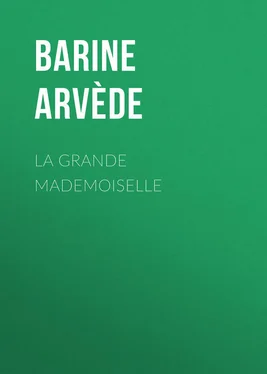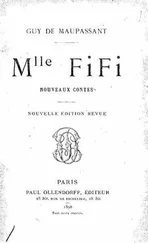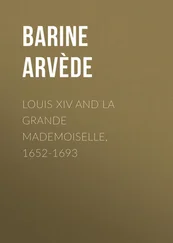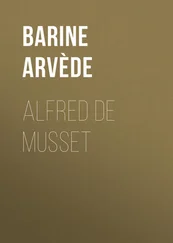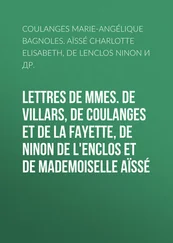Arvède Barine - La Grande Mademoiselle
Здесь есть возможность читать онлайн «Arvède Barine - La Grande Mademoiselle» — ознакомительный отрывок электронной книги совершенно бесплатно, а после прочтения отрывка купить полную версию. В некоторых случаях можно слушать аудио, скачать через торрент в формате fb2 и присутствует краткое содержание. Жанр: foreign_antique, foreign_prose, на английском языке. Описание произведения, (предисловие) а так же отзывы посетителей доступны на портале библиотеки ЛибКат.
- Название:La Grande Mademoiselle
- Автор:
- Жанр:
- Год:неизвестен
- ISBN:нет данных
- Рейтинг книги:5 / 5. Голосов: 1
-
Избранное:Добавить в избранное
- Отзывы:
-
Ваша оценка:
- 100
- 1
- 2
- 3
- 4
- 5
La Grande Mademoiselle: краткое содержание, описание и аннотация
Предлагаем к чтению аннотацию, описание, краткое содержание или предисловие (зависит от того, что написал сам автор книги «La Grande Mademoiselle»). Если вы не нашли необходимую информацию о книге — напишите в комментариях, мы постараемся отыскать её.
La Grande Mademoiselle — читать онлайн ознакомительный отрывок
Ниже представлен текст книги, разбитый по страницам. Система сохранения места последней прочитанной страницы, позволяет с удобством читать онлайн бесплатно книгу «La Grande Mademoiselle», без необходимости каждый раз заново искать на чём Вы остановились. Поставьте закладку, и сможете в любой момент перейти на страницу, на которой закончили чтение.
Интервал:
Закладка:
Generally, the nobility sacrificed learning, which it despised, to an impatient desire to see its sons "in active life." The nobles made pages of their sons as soon as they were thirteen or fourteen years old, or else sent them to the "Academy" to learn how to make proper use of a horse, to fence, to vault, and to dance. 11 11 Letter written by Pontis.
In the eyes of people of quality books and writings were the tools of plebeians; good enough for professional fine wits, or lawyers' clerks, but not fit for the nobility.
In the reign of Louis XIII., 12 12 Richelieu et la monarchie absolue.
M. d'Avenal wrote thus: "Gentlemen are perfectly ignorant, – the most illustrious and the most modestly insignificant alike. In this respect, with few exceptions, there is absolute equality between them."
The Constable, De Montmorency, had the reputation of a man of sound sense, "though he had no book learning, and hardly knew how to write his own name." Many of the great lords knew no more; and this ignorance was not shameful; on the contrary it was desired, affected, gloried in, and eagerly imitated by the lesser nobility.
"I never sharpen my pen with anything but my sword," proudly declared a gentleman.
"Ah?" answered a wit; "then your bad writing does not astonish me!"
The exceptions to the rule resulted from the caprices of the fathers; and they were sometimes found where least expected. The famous Bassompierre, arbiter of fashion and flower of courtiers, who, at one sitting, burned more than six thousand letters from women, who wore habits costing fourteen thousand écus, and could describe their details twenty years after he had worn them, had been very liberally educated, and according to a method which as may be imagined, was far in advance of the methods of his day. He had followed the college course until the sixteenth year of his age, he had laboured at rhetoric, logic, physics, and law, and dipped deep into Hippocrates and Aristotle. He had also studied les cas de Conscience . Then he had gone to Italy, where he had attended the best riding schools, the best fencing schools, a school of fortifications, and several princely Courts. At the age of nineteen years he was a superb cavalier and a good musician, he knew the world, and had made a very brilliant first appearance at Court.
The great Condé, General-in-Chief at the age of twenty-two years, had followed a college course at the school of Bourges, and had been "drilled" at the "Academy." He was tried by the fire of many a hard school. Wherever he went he was preceded by tart letters of instruction from his father. By his father's orders he was always received and treated as impartially as any of the lesser aspirants to education; he was severely "exercised," put on his mettle in various ways, and compelled to start out from first principles, no matter how well he knew them. When seven years old he spoke Latin fluently. When he reached the age of eleven he was well grounded in rhetoric, law, mathematics, and the Italian language. He could turn a verse very prettily; and he excelled in everything athletic.
Louis XIII. applauded this deep and thorough study, – perhaps because he regretted his lost opportunities. He told people that he should "wish to have … Monsieur the Dauphin," educated in like manner. 13 13 Mémoires of Lenet.
In measure as the century advanced it began to be recognised that a nobleman could "study" without detracting from his noble dignity. Louis de Pontis, who started out as a D'Artagnan, and ended at Port Royal, 14 14 See his Mémoires .
wished that time could be taken to instruct the youth of the nation. Answering some one who had asked his advice as to the education of two young lords of the Court, he wrote 15 15 A few years before his death, which occurred in 1670.
:
I will begin by avowing that I do not share the sentiments of those who wish for their children only so much science as is "needed" – as they call it – "for a gentleman"; I do not see things in that light. I should demand more science.
Since science teaches man how to reason and to speak well in public, is it not necessary to men, who, by the grandeur of their birth, their employment, and their duties, may need it at any moment, and who make use of it in their numerous meetings with the enlightened of the world? There are several personages who hold that the society of virtuous and talented women expands and polishes the mind of a young cavalier more than the conversation of men of letters; but I am not of their opinion…
Notwithstanding this declaration, Pontis desired that great difference should be established between the treatment of a child training for the robes and the treatment of one training for military service. "The first ought never to end his studies; it is sufficient for the second to study until his fifteenth or sixteenth year; after that time he ought to be sent to the Academy…"
In this opinion Pontis echoed the general impression. At the time when La Grande Mademoiselle was born, the man of quality no longer had a right to be "brutal," – in other words, to betray coarseness of nature. New customs and new manners exacted from the man of noble birth tact and good breeding, not science. But it was requisite that the nobleman's mind should be "formed" by the influence and discourse of a man of letters, so that he might be capable of judging witty and intellectual works ("works of the mind").
Marshal Montmorency, 16 16 Beheaded in 1632, aged thirty-seven years.
son of the Constable, who "hardly knew how to write his own name," had always in his employ cultured and intellectual people, who "made verses" for him on a multitude of such subjects as it was befitting his high estate that he should know; such subjects as were calculated to give him an air of intelligence and general information. His intellectual advisers informed him what to think and what to say of the current questions of the day. 17 17 Tallemant.
It was good form for great and noble houses to entertain at least one autheur . As there were no public journals or reviews, the autheur took the place of literary chronicles and literary criticism. He talked of the last dramatic sketch, or of the last new novel.
It was not long before another step in advance was taken, by which every nobleman was permitted to entertain his own personal autheur , and to compose "works of the mind" for himself. But he who succumbed to the epidemic ( cacoëthes scribendi ), owed it to his birth and breeding to hide his malady, or to make excuses for it.
Mlle. de Scudéry puts in the mouth of Sapho (herself) in Le Grand Cyrus 18 18 The first volume of Le Grand Cyrus appeared in 1649; the last in 1653.
:
Nothing is more inconvenient than to be intellectual or to be treated as if one were so, when one has a noble heart and a certain degree of birth; for I hold that it is an indubitable fact that from the moment one separates himself from the multitude, distinguishing one's self by the enlightenment of one's mind; when one acquires the reputation of having more mind than another, and of writing well enough – in prose or in verse – to be able to compose books, then, I say, one loses one half of one's nobility – if one has any – and one is not one half as important as another of the same house and of the same blood, who has not meddled with writings…
About the time this opinion saw the light, Tallemant des Réaux wrote to M. de Montausier, husband of the beautiful Julie d'Angennes, and one of the satellites of the Hôtel de Rambouillet: "He plys the trade of a man of mind too well for a man of quality – or at least he plays the part too seriously … he has even made translations…" This mention is marked by one just feature: the man who wrote, who could write, or who indulged in writing, was supposed to have judgment enough to keep him from attaching importance to his works. The fine world had regained the taste for refinement lost in the fracas of the civil wars; but in the higher classes of society was still reflected the horror of the preceding generations for pedants and for pedantry.
Читать дальшеИнтервал:
Закладка:
Похожие книги на «La Grande Mademoiselle»
Представляем Вашему вниманию похожие книги на «La Grande Mademoiselle» списком для выбора. Мы отобрали схожую по названию и смыслу литературу в надежде предоставить читателям больше вариантов отыскать новые, интересные, ещё непрочитанные произведения.
Обсуждение, отзывы о книге «La Grande Mademoiselle» и просто собственные мнения читателей. Оставьте ваши комментарии, напишите, что Вы думаете о произведении, его смысле или главных героях. Укажите что конкретно понравилось, а что нет, и почему Вы так считаете.
